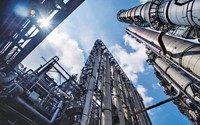Advertisement
Grab your lab coat. Let's get started
Welcome!
Welcome!
Create an account below to get 6 C&EN articles per month, receive newsletters and more - all free.
It seems this is your first time logging in online. Please enter the following information to continue.
As an ACS member you automatically get access to this site. All we need is few more details to create your reading experience.
Not you? Sign in with a different account.
Not you? Sign in with a different account.
ERROR 1
ERROR 1
ERROR 2
ERROR 2
ERROR 2
ERROR 2
ERROR 2
Password and Confirm password must match.
If you have an ACS member number, please enter it here so we can link this account to your membership. (optional)
ERROR 2
ACS values your privacy. By submitting your information, you are gaining access to C&EN and subscribing to our weekly newsletter. We use the information you provide to make your reading experience better, and we will never sell your data to third party members.
Business
Business Roundup
February 23, 2015
| A version of this story appeared in
Volume 93, Issue 8
Delta-Energy Group will spend $45 million on a plant in Natchez, Miss., that depolymerizes tires to obtain components that can be used as fuel, solvents, and chemical feedstocks. Delta-Energy currently markets carbon black from recycled tires.
Germany’s Merck and England’s FlexEnable have demonstrated a flexible plastic liquid-crystal display (LCD) using FlexEnable’s organic transistor technology and Merck’s organic semiconductor and liquid-crystal materials. The partners seek to make LCDs that are 10 times lighter and thinner than conventional glass LCDs.
Bio-on, an Italian biotech firm, and Eridania Sadam, an Italian sugar and food producer, are joining to commercialize biobased levulinic acid. Eridania Sadam will pay Bio-on $2 million to develop an industrial process to make the chemical from sugar industry by-products.
Air Liquide will spend around $170 million to build an air separation plant that supplies oxygen to a methanol facility in St. James Parish, La. The methanol plant, to be one of the largest in the U.S., is being built by China’s Yuhuang Chemical.
Tessenderlo has purchased Syngenta’s norflurazon herbicide assets. Norflurazon controls grass and broadleaf weeds around crops such as citrus, alfalfa, and grapes.
Grupa Azoty, a Polish chemical maker, plans to build an 80,000-metric-ton-per-year nylon 6 plant in Tarnow, Poland. The facility will use Uhde Inventa-Fischer’s two-stage nylon 6 process.
Nantero, a developer of carbon nanotubes for electronic devices, has raised $30 million from venture capital firms. The funds will allow Nantero to expand development of carbon-nanotube-based nonvolatile memory, which it calls NRAM, for smartphones, computers, and tablets.
Imperial College London will build a facility on its Babraham Research Campus in Cambridge, England, to house life sciences spin-off companies. The 49,500-sq-ft lab and office building is due to open in late 2016. Imperial already has spin-off quarters in London.



Join the conversation
Contact the reporter
Submit a Letter to the Editor for publication
Engage with us on Twitter